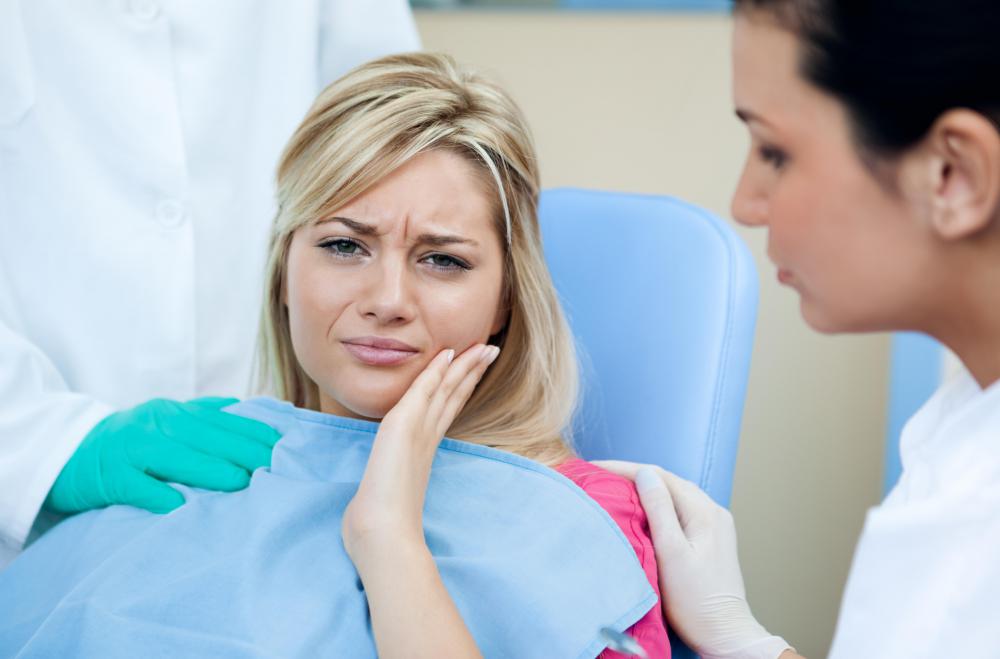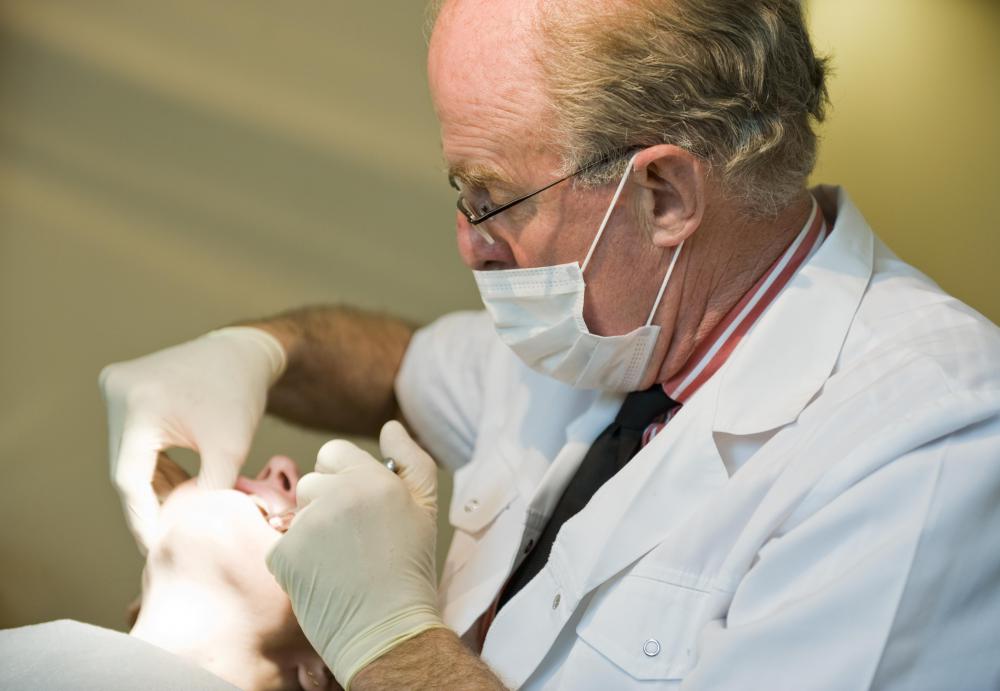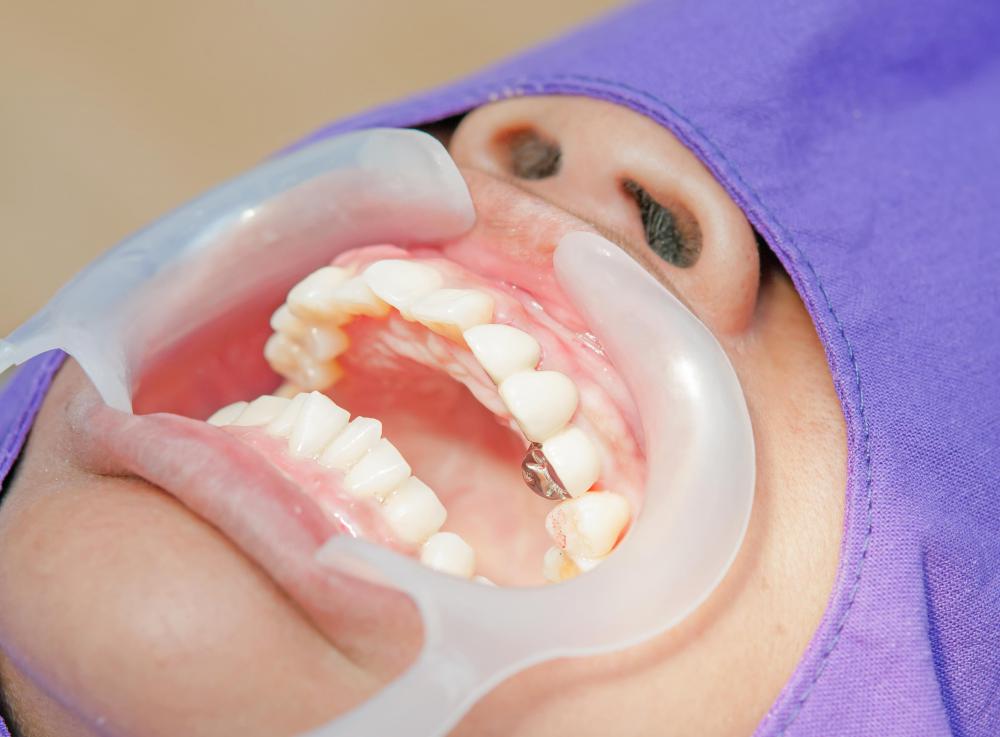At BeautyAnswered, we're committed to delivering accurate, trustworthy information. Our expert-authored content is rigorously fact-checked and sourced from credible authorities. Discover how we uphold the highest standards in providing you with reliable knowledge.
What Is Blue Light Teeth Whitening?
Blue light teeth whitening is a cosmetic dental procedure in which laser light beams are used in conjunction with bleaching creams in order to remove stains from the surface of the teeth and give the teeth a whiter, brighter appearance. In most cases the lights themselves aren’t doing anything to whiten the teeth, but rather they’re speeding the bleaching process otherwise happening as the chemicals interact with the outer tooth enamel and are making those bleaching agents more effective. In many cases this means the chemicals don’t have to be applied for as long, which can be beneficial on numerous fronts. Most of the time this sort of whitening happens in a dentist’s office and is professionally administered by trained technicians. Depending on the individual, it may take as many as four sessions to see truly white results; others are satisfied after one or two exposures. Sometimes light kits are also sold for home use. Using blue lights on the teeth and in the mouth is generally thought to be safe, but there are nevertheless some risks. As a result, anyone interested in this sort of tooth whitening is usually wise to do a bit of research beforehand in order to better understand the potential benefits and side effects.
Basic Concept and Main Goals

Teeth are often considered an important part of a person's appearance, and in many parts of the world white teeth are prized as a statement of health and even of beauty. There are a number of reasons why teeth lose their pearly luster in adulthood, though staining foods and beverages are usually some of the key contributors — coffee, tea, and red wine, when consumed regularly, can all cause a yellowing or dingy look to settle over the teeth, for instance. Tobacco products have a similar effect in most cases.

People have tried many different things to whiten their smiles. Bleaching creams, which are normally applied topically using fitted trays or molds, are one of the most popular. Adding a blue light-emitting diode (LED) bulb or laser to the process is thought to make these creams more effective and faster. Results from this treatment vary, but in some cases, the teeth will whiten up to eight shades after a few sessions.
How It Works

Blue light teeth whitening is normally performed in a dentist's office and usually takes about an hour to complete. Dentists first apply a light-sensitive cream to the teeth, then shine a laser blue light beam. This is an ultraviolet light that causes the chemicals and bleach to work faster. Dentists also take some safety precautions when using the technology, including in most cases placing a protective gel over the gums and using a rubber shield or dental dam as well.
At-Home Options

There are also a number of blue light teeth whitening systems available for home use. Many of these systems come in the form of a kit and are far less expensive procedures offered professionally in-office. Before using an over-the-counter kit, however, it’s usually a good idea for people to check with their dentist for approval first, since not all kits are appropriate for all people.

Some tooth whitening systems exceed the recommended dosage of bleach and peroxide, which can be harmful to the user. The American Dental Association only approves of tooth whitening systems that contain less than 35% hydrogen peroxide, and most other regulatory agencies around the world have similar guidelines. Furthermore, not everyone achieves their desired results with an over-the-counter system.
Risks and Potential Drawbacks

There is a potential danger from the bleach used in teeth whitening systems. Individuals with sensitive teeth may feel sharp pains in reaction to the bleach, which dentists call “zingers.” One way to alleviate or prevent pain from bleach is to use a desensitizing gel before undergoing blue light treatments. Too much bleach can also cause gum irritation, uneven whiteness, and bluish enamel.

Blue light teeth whitening is not a procedure that every person should undergo, either. Dentists usually try to identify suitable candidates, and they will typically let a patient know if this treatment is not appropriate. They can also recommend a better whitening alternative if needed.
AS FEATURED ON:
AS FEATURED ON:

















Discussion Comments
@ceilingcat - Wow, I've heard of advertisers trying to play on peoples insecurities to sell something. But not dentists! That is really ridiculous. I hope you found another dentist after that.
I'm a little too scared to get my teeth whitened, because I've had a lot of dental work done. I'm not even sure I'm a good candidate-and my teeth are already really sensitive, so I think that would make it worse.
A friend of mine had her teeth whitened awhile ago, and she said they were really sensitive for awhile after the procedure. I don't think I'm willing to go through all that.
I personally think this whole tooth whitening trend is getting a little bit out of control. Yes, it is great to have a set of nice, white teeth. But not at the expense of the overall health of your mouth!
I think dentists really try to "up-sell" this procedure to everyone, even people who shouldn't have it done, which I think is ridiculous. I actually had a dentist try this on me a few years ago.
He told me I was a "beautiful girl" but I would look much better if I got my teeth whitened. My teeth are actually a pretty normal looking shade, not yellow, so I said no thanks. Later I realized he was probably trying to make more money for his practice! So sneaky.
Post your comments